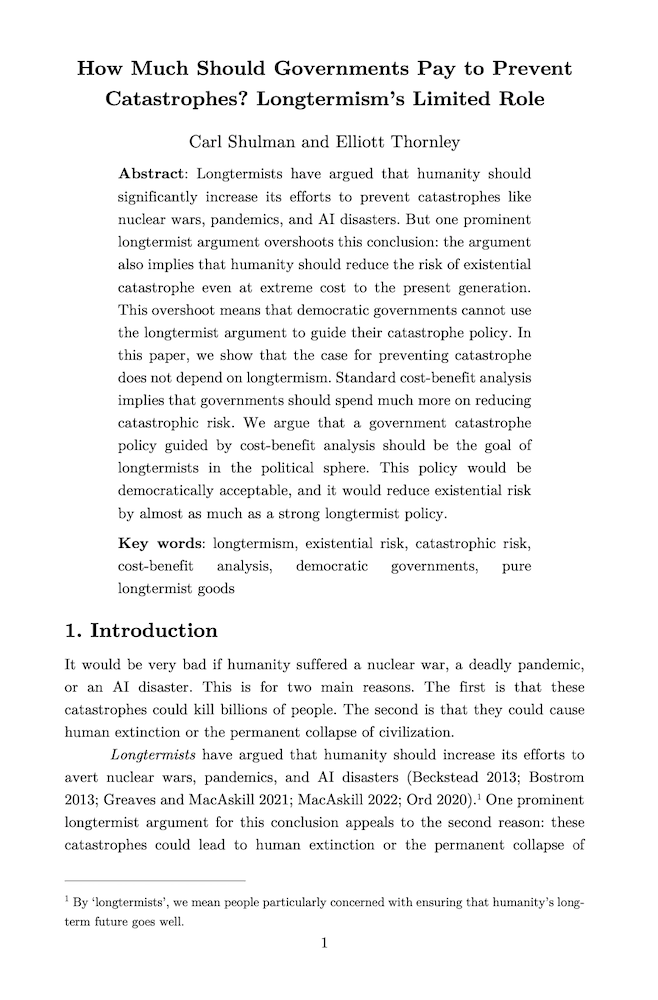How much should governments pay to prevent catastrophes? Longtermism's limited role
Carl Shulman (Advisor, Open Philanthropy) and Elliott Thornley (Global Priorities Institute, University of Oxford)
GPI Working Paper No. 8-2024, forthcoming in Essays on Longtermism
Longtermists have argued that humanity should significantly increase its efforts to prevent catastrophes like nuclear wars, pandemics, and AI disasters. But one prominent longtermist argument overshoots this conclusion: the argument also implies that humanity should reduce the risk of existential catastrophe even at extreme cost to the present generation. This overshoot means that democratic governments cannot use the longtermist argument to guide their catastrophe policy. In this paper, we show that the case for preventing catastrophe does not depend on longtermism. Standard cost-benefit analysis implies that governments should spend much more on reducing catastrophic risk. We argue that a government catastrophe policy guided by cost-benefit analysis should be the goal of longtermists in the political sphere. This policy would be democratically acceptable, and it would reduce existential risk by almost as much as a strong longtermist policy.
Other working papers
Moral uncertainty and public justification – Jacob Barrett (Global Priorities Institute, University of Oxford) and Andreas T Schmidt (University of Groningen)
Moral uncertainty and disagreement pervade our lives. Yet we still need to make decisions and act, both in individual and political contexts. So, what should we do? The moral uncertainty approach provides a theory of what individuals morally ought to do when they are uncertain about morality…
Heuristics for clueless agents: how to get away with ignoring what matters most in ordinary decision-making – David Thorstad and Andreas Mogensen (Global Priorities Institute, Oxford University)
Even our most mundane decisions have the potential to significantly impact the long-term future, but we are often clueless about what this impact may be. In this paper, we aim to characterize and solve two problems raised by recent discussions of cluelessness, which we term the Problems of Decision Paralysis and the Problem of Decision-Making Demandingness. After reviewing and rejecting existing solutions to both problems, we argue that the way forward is to be found in the distinction between procedural and substantive rationality…
Evolutionary debunking and value alignment – Michael T. Dale (Hampden-Sydney College) and Bradford Saad (Global Priorities Institute, University of Oxford)
This paper examines the bearing of evolutionary debunking arguments—which use the evolutionary origins of values to challenge their epistemic credentials—on the alignment problem, i.e. the problem of ensuring that highly capable AI systems are properly aligned with values. Since evolutionary debunking arguments are among the best empirically-motivated arguments that recommend changes in values, it is unsurprising that they are relevant to the alignment problem. However, how evolutionary debunking arguments…

